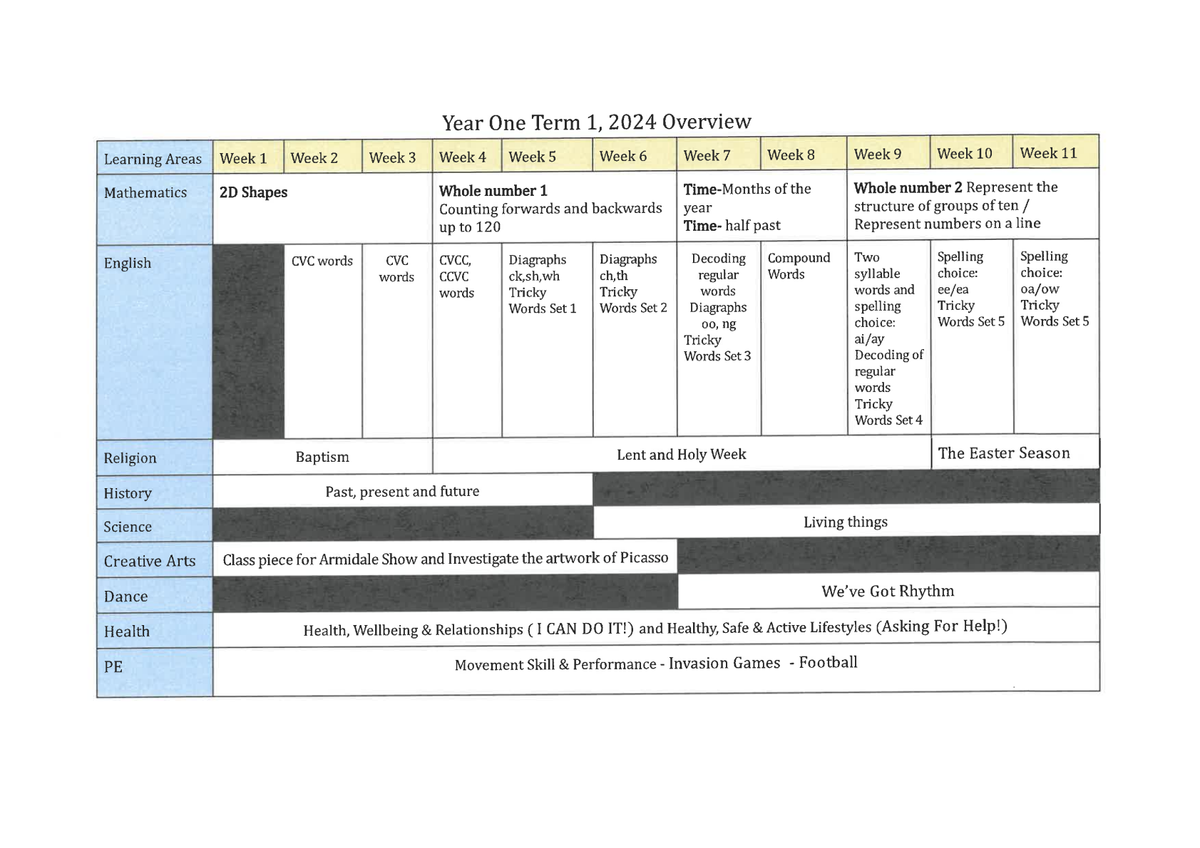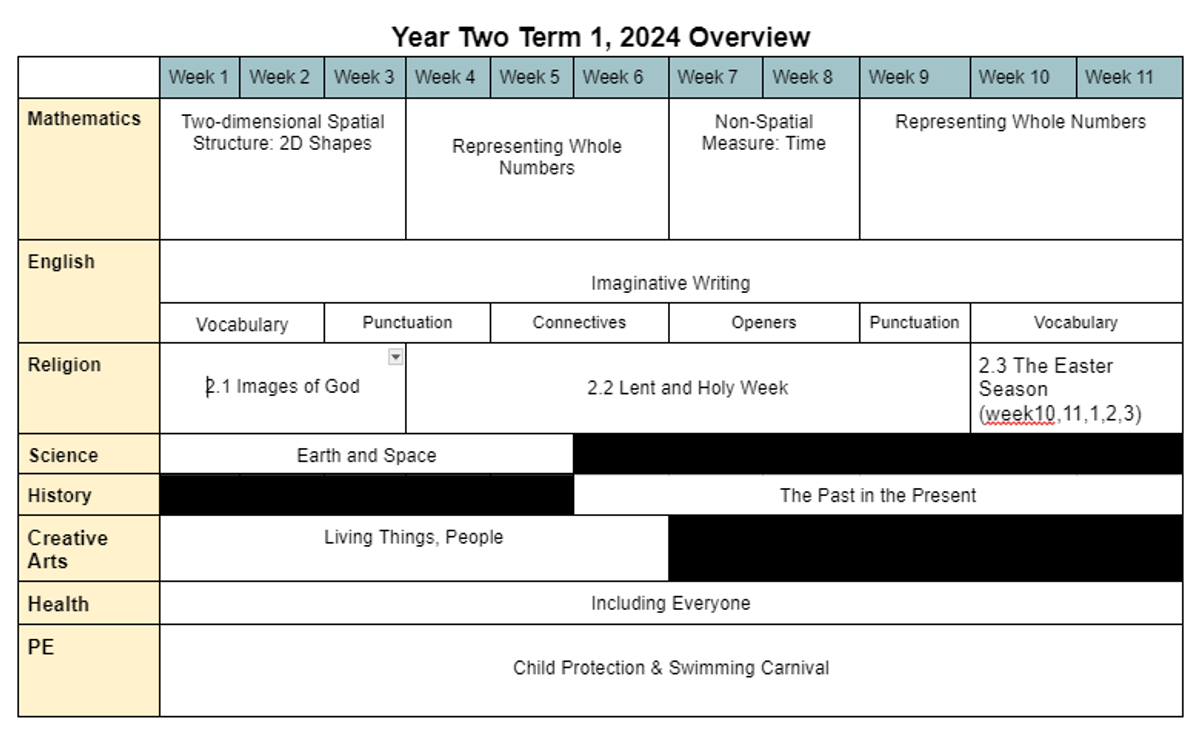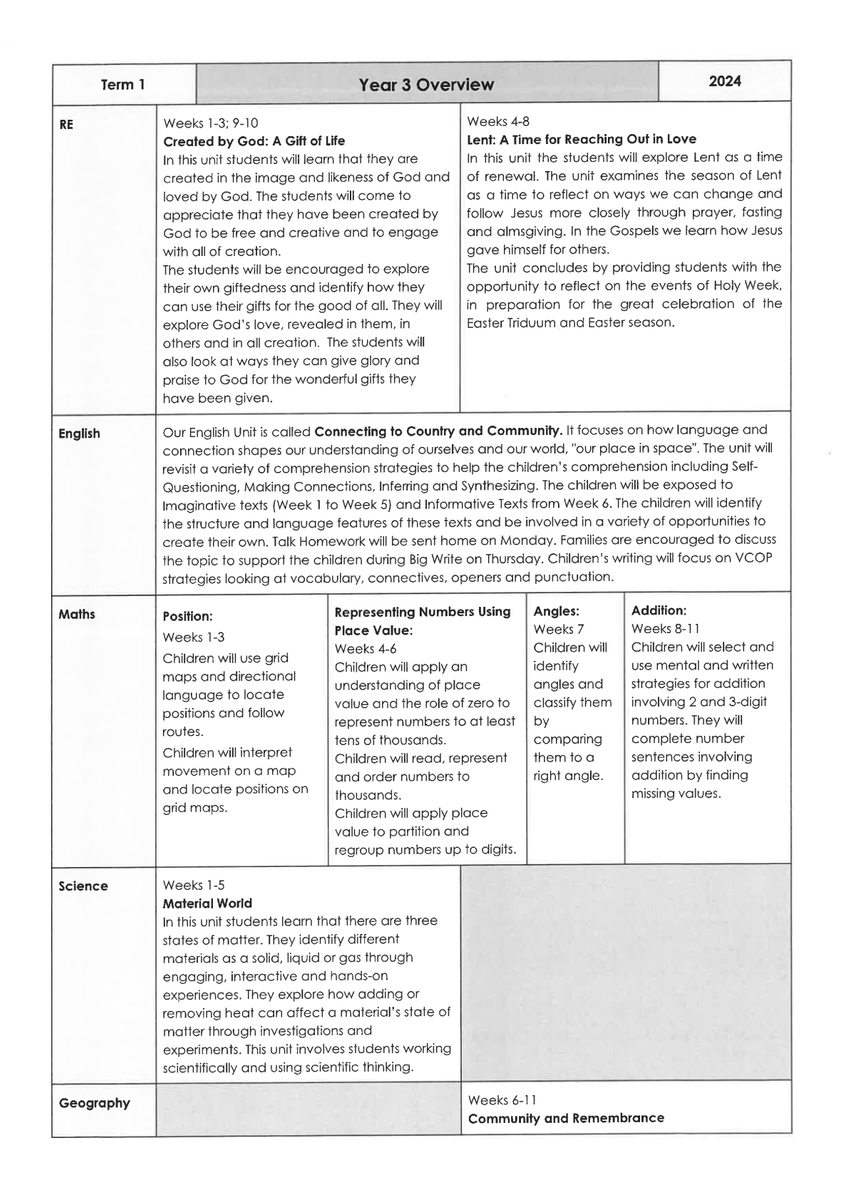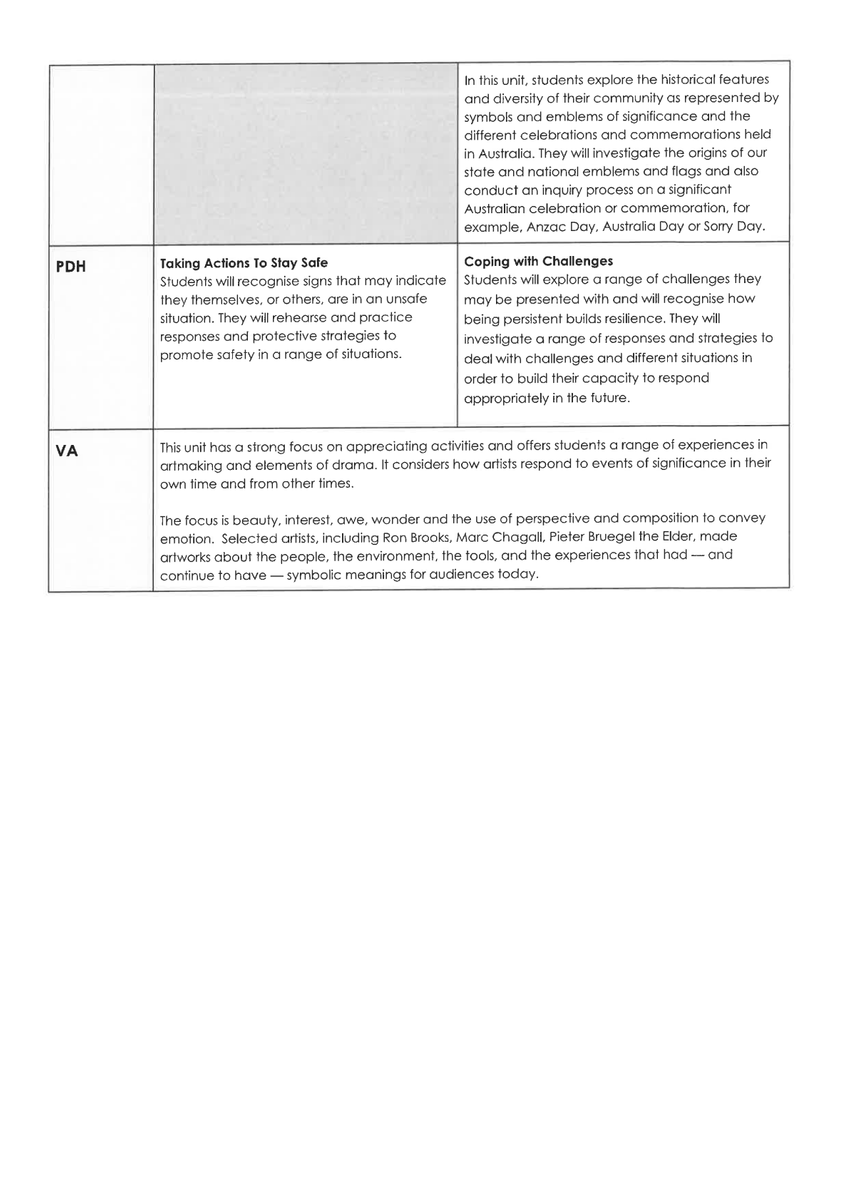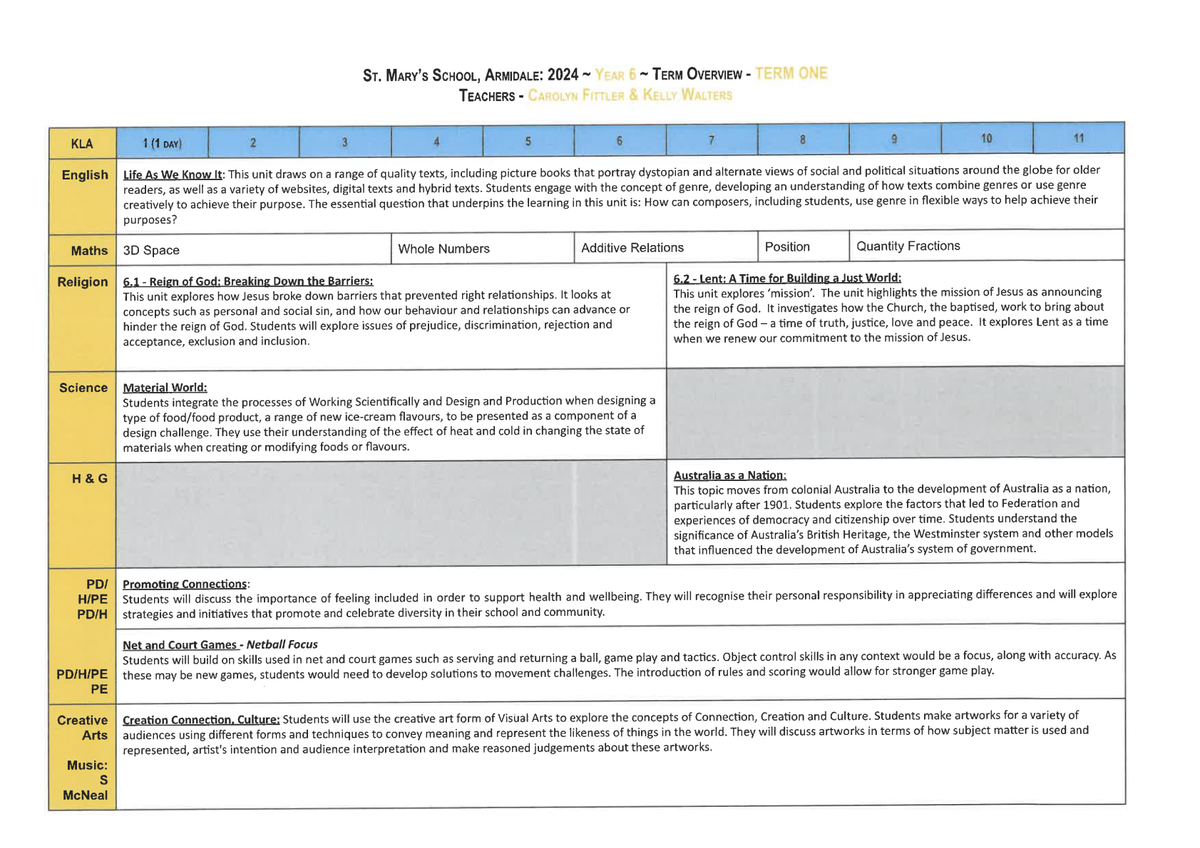K - Yr 6 Learning

Kindergarten & Best Start Interviews
Miss Marshall and Mrs Fletcher have been conducting the Best Start Interviews with each new Kindergarten student. This assessment will provide the teachers with important information about each child's early literacy and numeracy skills, and is used to plan activities based on individual learning needs. In the upcoming weeks, Kindergarten parents will receive feedback on the assessment and information about ways they can support their child’s learning at home
Term 1 Overview for Grades K-6
Year 1
Year 1 2024 Daily Reminders
Monday - Talk homework sent home for Big Write on Friday
Wednesday - Bring home readers to school
Thursday - Home readers returned home
Friday - Library day
Year 2
Year 3
We are currently learning about position in Maths.
Teaching children about using directional language and understanding routes with grid maps can be both educational and fun. Here are some tips for parents to help their children develop these skills:
Start with Basic Concepts:
- Begin by introducing basic concepts like left, right, up, down, forward, and backward in everyday activities.
- Use simple commands like "Go left to the kitchen" or "Move forward two steps."
Use Everyday Language:
- Incorporate directional language into daily routines. For example, when walking or driving, talk about the directions you're going.
- Discuss the cardinal directions (north, south, east, west) in relation to your home or other familiar places.
Create a Home Grid Map:
- Make a simple grid map of your home or a room. Use graph paper or draw a grid on a large sheet of paper.
- Label key areas in the house (e.g., kitchen, bedroom) and practice giving and following directions within the grid.
Play Map Games:
- Create fun games that involve maps and directions. For instance, hide a toy and provide directions for your child to find it.
- Make a treasure map together, marking key locations and using directional language to guide the way.
Explore Outdoor Environments:
- Take walks or outings to parks and use directional language to describe the route. Point out landmarks and discuss the path you're taking.
- Bring a simple map of the area and involve your child in navigating.
Use Technology:
- Utilise map apps or online maps to show your child how to navigate digitally. Explain the symbols and icons commonly used on maps.
- Play interactive games or apps that involve following directions on a virtual map.
Remember that learning directional language and map skills is a gradual process, and repetition and practical application will reinforce the concepts over time. Make the learning experience enjoyable and hands-on to keep your child engaged.
Year 4
Overview Year 4 2024
Tuesdays are Library borrowing days after Choir.
| Religion | This unit explores "the law of love". It begins by recalling with students the purpose of rules in groups and communities. It then examines the Ten Commandments, focussing on their purpose and principles for living in relationship with God and each other. This forms the basis for introducing and exploring Jesus' 'new commandment' with reference back to the Commandments. The unit leads to a deeper understanding of how the Commandments and Jesus' 'new commandment' guide us in living in relationship with God and others. This unit focuses on the Liturgical Season of Lent as a time to reflect on how we live our lives. It explores choices and their impact on our growth and conversion. It teaches about the sacrament of Penance. The unit then reviews the events of Holy Week through the Scriptural Stations of the Cross. |
| English | The unit we are undertaking this term is called “Our Place in Space”, and focuses on how texts help us shape our understanding of place and context in our world and the world around us. We undertake a range of modelled, shared and guided reading and writing activities in class to develop reading and writing skills, and also undertake spelling and handwriting activities throughout the week. Big Write will be undertaken each Thursday, and Home Talk will be sent home each Monday as a paper copy and also sent as an email via Compass. |
| Maths | Position, Representing Numbers using Place Value, Angels and Addition and Inverse Operations |
| HSIE | History - Learning how to describe people, events and actions related to world exploration and its effects Learning how to describe and explains effects of British colonisation in Australia Learning how to apply the skills of historical inquiry and communication |
| Science | The unit that we are undertaking in science this term is called “Using materials for a Purpose”. In this unit, students develop an understanding of the properties of natural and processed materials and how these influence their use. They explore the property of elasticity in greater depth and conduct an experiment to discover which sports ball has the highest elasticity.
|
| PDH/PE | PE - Net and Court games: Tennis focus PDH - Students will identify roles, rights and responsibilities in different relationships, exploring how they can influence theirs and others emotional and social wellbeing. They will recognise types of abuse and bullying behaviours and will practise strategies they can employ when they themselves feel unsafe or they see others in need of assistance or help. |
| Visual Arts | A combined Year 4 Artwork for the Armidale Show Two individual artworks for the School Art Show which is early Term 2. One focus will be on Vincent Van Gogh - Starry Night and Jackie French’s Fire and Flood. |
Year 6
.

